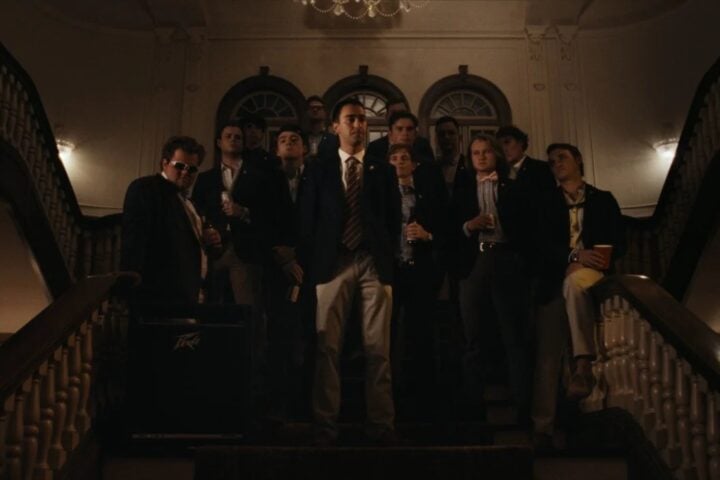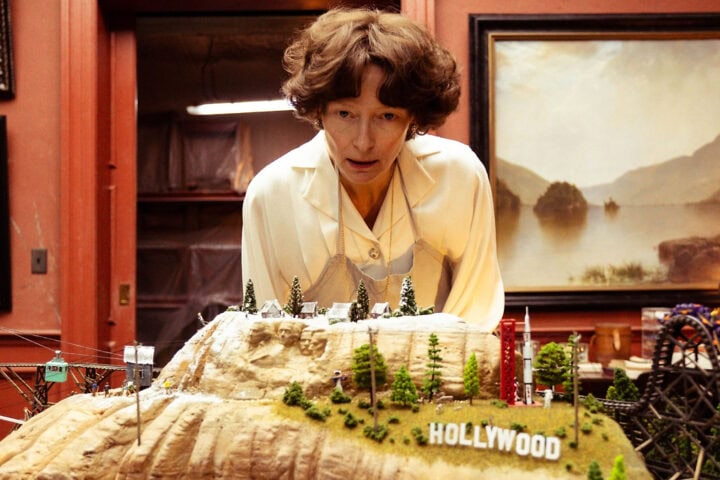Not unlike that of Frank Sinatra and Dean Martin, whose off-screen friendship raised the bar on their on-screen chemistry across several Rat Pack films, George Clooney and Brad Pitt’s smooth-operating, cross-demographic appeal speaks to a timeless allure. Theirs is a brand of debonair masculinity that seems to only exist in the Hollywood imaginary, and it’s one that writer-director Jon Watts’s action comedy Wolfs is content to lazily coast on.
The witty repartee between Clooney and Pitt’s characters, two professional fixers who find themselves hired for the same job, feels like the only thing holding the film together. Scene after scene finds the men trying to exercise their masculinist domination over each other—a dick-wagging contest that grows old fast. And when they aren’t ribbing each other, they’re sexily standing around brooding. It’s like watching an episode of Variety Studio: Actors on Actors if the craft being discussed were crime fixing and the actors hated each other for no reason.
Margaret (Amy Ryan), a high-powered district attorney running for re-election on a campaign centered around being “tough on crime,” needs someone to clean up the accidental death of a young man, seemingly an escort, inside her Manhattan hotel room. With blood staining her blouse and bits of glass covering her phone, she nervously rings up a fixer who she’s been told is the best—and ostensibly only one—in the business. Minutes later, Clooney’s fixer, identified only as “Margaret’s Man” in the end credits, shows up. But not five minutes into his work does another fixer, “Pam’s Man” (Pitt), arrive on the scene, there on orders of the hotel manager.
From the disembodied female scream heard over a shot of high-rises on a winter’s night to the mix of panic and doggedness, at once funny and strikingly vulnerable, that Ryan brings to her part, the film’s setup has an electric, almost Hitchcockian kick to it. But, then, Margaret is immediately sent home by the two fixers, who resist the inevitability that they have to work together, a prospect that gets even more harrowing when they discover a backpack containing $250,000 worth of heroin. Suddenly, the fixers are roaming the streets of Chinatown, alongside a young kid (Austin Abrams) who inadvertently holds the key to their salvation.
Watts has an obvious gift for creating suspense out of the mundane, as in an extended car and foot chase through the lightly falling snow that’s captured in a series of nervy long takes, and a later sequence at a Croatian mobster’s family wedding that you come to feel, deep down, is a game of life and death. But the film’s deference to Clooney and Pitt’s star power proves debilitating. The self-conscious dialogue always feels as if it’s been specifically tailored to the actors rather than their characters, with frequent comic asides lamely predicated on massaging deflated male egos. It never becomes all that clear why Margaret’s Man and Pam’s Man detest each other so much, and yet that mutual disdain is what Watts relies on to fuel the action.
Watts isn’t wrong to assume that there’s comfort and pleasure to be found in watching two insanely cool people hang out for more than 100 minutes, especially two actors who seem inextricably linked in the cultural zeitgeist thanks to their work on the Ocean’s films. But Wolfs wishes that it exuded a cool as effortless as that of Steven Soderbergh’s original Ocean’s Eleven. By contrast, Watts’s film is a textureless gift-shop souvenir, one that feels like an extended advertisement for Clooney and Pitt as brands, all sleek surfaces with no sharp edges.
Since 2001, we've brought you uncompromising, candid takes on the world of film, music, television, video games, theater, and more. Independently owned and operated publications like Slant have been hit hard in recent years, but we’re committed to keeping our content free and accessible—meaning no paywalls or fees.
If you like what we do, please consider subscribing to our Patreon or making a donation.





